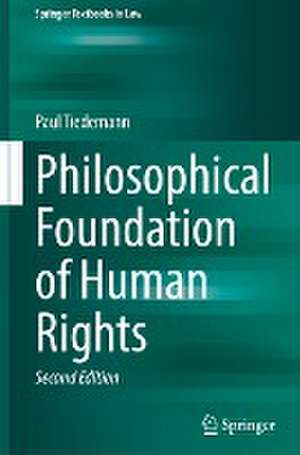Philosophical Foundation of Human Rights: Springer Textbooks in Law
Autor Paul Tiedemannen Limba Engleză Hardback – 7 oct 2023
This textbook presents a range of classical philosophical approaches in order to show that they are unsuitable as a foundation for human rights. Only the conception of human dignity –based on the Kantian distinction between price and dignity – can provide a sufficient basis. The derivation of human rights from the principle of human dignity allows us to identify the most crucial characteristic of human rights, namely the protection of personhood. This in turn makes it possible (1) to distinguish between real moral human rights and spurious ones, (2) to assess the scope of protection for many codified human rights according to the criteria of “core” and “yard,” and (3) offers a point of departure for creating new, unwritten human rights. This philosophical basis supports a substantial reassessment of the case law on human rights, which will ultimately allow us to improve it with regard to legal certainty, clarity and cogency.
In the second edition, errors have been corrected in numerous places, the text has been made clearer and easier to understand. In addition, more recent human rights issues have been newly included, especially those related to the Corona epidemic and climate change.
The textbook is primarily intended for advanced law students who are interested in a deeper understanding of human rights. It is also suitable for humanities students, and for anyone in the political or social arena whose work involves human rights and their enforcement.
Each chapter is divided into four parts: Abstracts, Lecture, Recommended Reading, and Questions to check reader comprehension. Sample answers are included at the end of the book.
| Toate formatele și edițiile | Preț | Express |
|---|---|---|
| Paperback (1) | 495.09 lei 6-8 săpt. | |
| Springer International Publishing – 28 iun 2021 | 495.09 lei 6-8 săpt. | |
| Hardback (1) | 631.84 lei 3-5 săpt. | +31.78 lei 5-11 zile |
| Springer International Publishing – 7 oct 2023 | 631.84 lei 3-5 săpt. | +31.78 lei 5-11 zile |
Preț: 631.84 lei
Preț vechi: 789.80 lei
-20% Nou
Puncte Express: 948
Preț estimativ în valută:
120.90€ • 126.55$ • 100.63£
120.90€ • 126.55$ • 100.63£
Carte disponibilă
Livrare economică 10-24 martie
Livrare express 22-28 februarie pentru 41.77 lei
Preluare comenzi: 021 569.72.76
Specificații
ISBN-13: 9783031322914
ISBN-10: 3031322916
Pagini: 418
Ilustrații: XVII, 418 p. 82 illus., 21 illus. in color.
Dimensiuni: 155 x 235 x 31 mm
Greutate: 0.79 kg
Ediția:2nd ed. 2023
Editura: Springer International Publishing
Colecția Springer
Seria Springer Textbooks in Law
Locul publicării:Cham, Switzerland
ISBN-10: 3031322916
Pagini: 418
Ilustrații: XVII, 418 p. 82 illus., 21 illus. in color.
Dimensiuni: 155 x 235 x 31 mm
Greutate: 0.79 kg
Ediția:2nd ed. 2023
Editura: Springer International Publishing
Colecția Springer
Seria Springer Textbooks in Law
Locul publicării:Cham, Switzerland
Cuprins
Introduction.- Utilitarian and Aristotelian Approach.- The Social Contract Approach.- The Human-Dignity-Approach.- The Human-Dignity-Principle I.- The Human-Dignity-Principle II.- From Human Dignity to Human Rights.- Human Rights concerning the Protection of Physical and Mental Integrity.- Rights under Detention.- Human Rights concerning the protection of Intellectual Integrity.- Human Right to Privacy.- Human Right to the Freedom of Conscience.- Human Right to Spiritual Freedom.- Human Right to Life.- Social Human Rights.- The Right to Asylum.- Fake Human Rights.- The Principle of Liberty.- The Principle of Equality.- Rights in Conflict.- Do you still remember – the answers.
Notă biografică
Paul Tiedemann, born in 1950, holds a doctorate in law and philosophy and was a judge in the administrative jurisdiction of Hesse until his retirement in 2015. From 1988 to 2004, he also taught administrative and constitutional law at the University of Applied Sciences for Public Management and Security in Wiesbaden administrative and constitutional law and from 2004 to 2007 philosophy of law at Saarland University. In 2007, he founded the first German Refugee Law Clinic at the Justus Liebig University of Giessen and was appointed honorary professor there in 2012. In addition, he was an adjunct professor at Özyeğin University in Istanbul from 2012 to 2018 and a member of the board of the Research Institute for German Law there.
Textul de pe ultima copertă
This textbook presents a range of classical philosophical approaches in order to show that they are unsuitable as a foundation for human rights. Only the conception of human dignity –based on the Kantian distinction between price and dignity – can provide a sufficient basis. The derivation of human rights from the principle of human dignity allows us to identify the most crucial characteristic of human rights, namely the protection of personhood. This in turn makes it possible (1) to distinguish between real moral human rights and spurious ones, (2) to assess the scope of protection for many codified human rights according to the criteria of “core” and “yard,” and (3) offers a point of departure for creating new, unwritten human rights. This philosophical basis supports a substantial reassessment of the case law on human rights, which will ultimately allow us to improve it with regard to legal certainty, clarity and cogency.
In the second edition, errors have been corrected in numerous places, the text has been made clearer and easier to understand. In addition, more recent human rights issues have been newly included, especially those related to the Corona epidemic and climate change.
The textbook is primarily intended for advanced law students who are interested in a deeper understanding of human rights. It is also suitable for humanities students, and for anyone in the political or social arena whose work involves human rights and their enforcement.
Each chapter is divided into four parts: Abstracts, Lecture, Recommended Reading, and Questions to check reader comprehension. Sample answers are included at the end of the book.
Caracteristici
Provides an introduction to the nature and ethical foundations of human rights Offers an accessible overview that does not require a prior philosophical background Includes brief information on historical references








